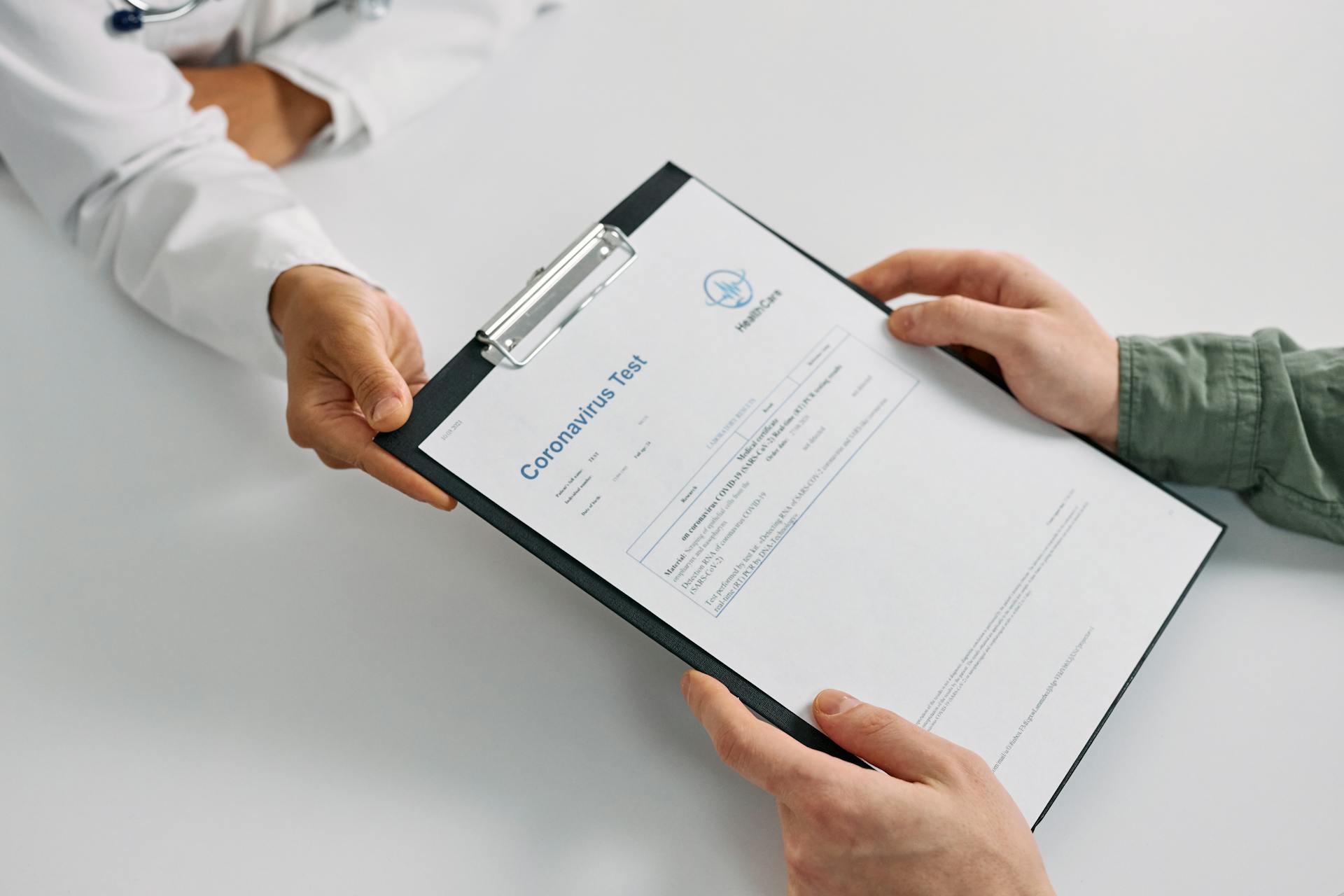
Paying medical bills without insurance can be a daunting task, but there is hope. You can negotiate with the hospital to reduce the bill by 30-50% if you're willing to pay upfront.
Medical billing companies can charge exorbitant fees, up to 25% of the total bill, so it's essential to research and compare prices before hiring one. Many hospitals offer financial assistance programs that can help reduce the cost of medical bills.
You can also consider crowdfunding to pay for medical expenses, but be aware that you may need to pay taxes on the donations you receive. Some crowdfunding platforms, like GoFundMe, have a 2.9% transaction fee.
Government Assistance
Government Assistance can be a lifeline for those struggling to pay medical bills without insurance. Medicaid and the Children’s Health Insurance Program (CHIP) provide medical expense assistance to those who can’t afford insurance.
Medicaid is a government program that offers health care coverage to low-income people, providing assistance to more than 70 million Americans. Qualification requirements vary by state and depend on age, income, household size, and disability.
A unique perspective: How Do Insurance Company Pay Accident Medical Bills
You can apply for Medicaid through your state agency. Federal law mandates that certain groups, including low-income families, qualified pregnant women, and children, must be covered by Medicaid. Some states provide additional coverage to other groups based on factors like income and household size.
The Children’s Health Insurance Program (CHIP) provides low-cost medical help to families who don’t meet the requirements for Medicaid but can’t afford private insurance. Each state has different Medicaid and CHIP requirements, so it’s essential to check with your state’s Medicaid program to learn more.
If you’re a veteran, have a disability, or are at least 65 years old, you may be eligible for Medicare or medical care through the Department of Veterans Affairs. You can contact the VA to learn more about your options.
Here are some key takeaways to keep in mind when exploring government assistance for medical bills:
- Medicaid and CHIP provide medical expense assistance to those who can’t afford insurance.
- Qualification requirements vary by state and depend on age, income, household size, and disability.
- Each state has different Medicaid and CHIP requirements, so it’s essential to check with your state’s Medicaid program.
- Veterans, people with disabilities, and those 65 and older may be eligible for Medicare or medical care through the Department of Veterans Affairs.
Negotiate
You can try negotiating a bill with the doctor, hospital, or bill collector. This can be a good option if you're unable to pay the full amount billed.
Ask what the lowest rate the provider charges insurance companies and try to get that rate applied to what you owe. This is a common tactic that can help reduce the amount you pay.
Don't be afraid to explain your situation to the collector, emphasizing your inability to pay the full amount billed. If you don't have health insurance, ask what Medicare reimburses for the service or treatment and offer to pay that.
You can also offer to provide information confirming your income, which may persuade the hospital or clinic to reduce or eliminate your debt. If a hospital or clinic sees your income is low, it might be willing to reduce, negotiate or even eliminate your debt.
Try to remain calm when you discuss your bill and always take notes. Be certain to ask the name of the person taking your call and any reference number that might be assigned to your account so that you can take the issue up with someone else, if necessary.
If you have enough money on hand to pay a reduced bill, offer to pay immediately. This can be a good way to settle the debt and avoid further negotiations.
Remember that most health-care facilities don't want to go to collections. To avoid that step, they usually will work with patients to find a payment plan that will help the patient and ensure the hospital is paid, albeit over time.
Take a look at this: Can You Get Dental Insurance without Health Insurance
Financial Assistance and Resources
You have rights as a patient to discuss the financial aspects of your treatment, and your doctor may be able to suggest more affordable alternatives based on your budget and insurance coverage.
Many hospitals have a written Financial Assistance Policy, which explains the criteria for help and how to apply for aid. To qualify, you must meet certain criteria, which vary by state or hospital.
You can also apply for government assistance programs, such as Medicare or the Children's Health Insurance Program (CHIP), which provide financial help with medical bills for low-income families. The Health Resources and Services Administration has several programs that offer affordable care to those struggling with medical expenses.
Here are some organizations that may be able to help you tackle your medical bills:
- USA.gov for medical and health care benefits.
- State Health Insurance Assistance Program (SHIP) for help navigating Medicare.
- The Healthwell Foundation, the Patient Access Network (PAN) Foundation and UnitedHealthcare Children’s Foundation for help with things not covered by insurance, or help finding grants.
- NeedyMeds for help finding prescription assistance programs and drug coupons.
Children's Health Insurance Program (CHIP)
The Children's Health Insurance Program (CHIP) is a vital resource for families who can't afford private insurance but don't qualify for Medicaid. Each state has its own requirements for CHIP and Medicaid.
See what others are reading: How Far Back Will Medicaid Pay for Medical Bills
If you're a low-income parent or guardian, CHIP can help cover the cost of medical needs for your children. This program is aligned with Medicaid and provides financial assistance to families who can't afford private insurance.
To qualify for CHIP, you'll need to meet your state's specific requirements, which can be different from state to state. You can find out more about CHIP and Medicaid requirements by contacting your state's Medicaid program.
You can apply for CHIP through your state's Medicaid program, which is usually the same place where you'd apply for Medicaid. This way, you can get help with medical bills and ensure your children receive the care they need.
Related reading: Do You Need Insurance to Start a Cleaning Business
Resources
If you're struggling to pay medical bills, there are several resources available to help. You can start by asking your doctor for resources, as they may be able to suggest more affordable alternatives based on your budget and insurance coverage.

The Affordable Care Act mandates that hospitals have a written Financial Assistance Policy, which explains the criteria for help and how to apply for aid. This policy may include eligibility requirements, such as income level and dependents in the household.
To qualify for financial assistance, you may need to meet certain criteria, which vary by state or hospital. For example, Nationwide Children's Hospital requires patients to use all other available resources before qualifying for financial assistance, while the state of Ohio's OhioHealth Financial Assistance Program offers eligibility after application to those with family income at or below 400% of the federal poverty line.
There are also several non-profit organizations that provide assistance with medical bills, such as the HealthWell Foundation, which offers financial assistance for prescription copays, health insurance premiums, and deductibles. You can also search for healthcare-focused charities and nonprofits online to see if any apply to your situation.
If you're unable to pay your medical bills, you can also consider hiring a medical bill advocate to negotiate on your behalf. However, be sure to carefully research and select a reputable advocate to avoid scams.
Another option is to ask your hospital or clinic if they offer a payment plan, which can allow you to pay off your medical bills in installments over time. You can also search online for financial assistance programs, such as the Patient Advocate Foundation, which provides copay relief and financial grants to those who meet the criteria for eligibility.
Consider reading: Business Insurance Today

Here are some resources to consider:
- HealthWell Foundation: Offers financial assistance for prescription copays, health insurance premiums, and deductibles.
- Patient Advocate Foundation: Provides copay relief and financial grants to those who meet the criteria for eligibility.
- OhioHealth Financial Assistance Program: Offers eligibility after application to those with family income at or below 400% of the federal poverty line.
- Nationwide Children's Hospital: Requires patients to use all other available resources before qualifying for financial assistance.
Remember to review and understand your medical bills and insurance coverage carefully, as errors can occur and consumers may be unfamiliar with their policy.
Obtain Policy Copy
To obtain a copy of the policy, you can simply ask your hospital for it. They are obligated to provide the policy, so don't be afraid to ask.
Reading the policy beforehand will give you a clear understanding of the details of the financial assistance program. This will help you navigate the application process more smoothly.
Hospitals are required to provide the policy, so it's essential to ask for it before applying for financial assistance.
Intriguing read: Why Is Health Insurance so Expensive in the Us
Alternative Options
If you're uninsured, there are options to help you pay medical bills. Nearly 8% of adults in the U.S. lack health insurance, but it's essential to understand your options and get financial assistance as soon as possible.
Check Healthcare.gov to see if your state has expanded Medicaid. If not, call your state Medicaid office to find out if you're still eligible for help paying medical bills.

You might also consider using a patient advocacy service to help you understand how to pay medical bills without insurance. These services can also help you negotiate medical bills on your behalf and offer assistance with costs you can't cover alone.
Personal loans can be a viable option to help you pay medical bills, but be aware that they come with risks of additional interest, fees, and negative credit score impact if you miss payments. Loan amounts typically range from $1,000 to $100,000.
A 0% interest credit card can be a good option, but you'll need good to excellent credit to qualify. Be sure to pay off your balance before the promotional interest period ends and an interest rate kicks in.
Medical bankruptcy can be a last resort, but it can short circuit the collection process. However, before considering medical bankruptcy, discuss your situation with a nonprofit credit counseling agency to explore alternatives such as consolidating medical bills.
Suggestion: Is There Interest on Medical Bills
Notify Debt Collectors

When you're struggling to pay medical bills, it's essential to notify debt collectors that you're seeking assistance.
You can do this by contacting the debt collection agency directly and asking them to pause collections while you complete the application process.
Debt collectors should honor this request, so be sure to document the conversation and follow up to ensure they're holding off on further action.
Notify the debt collection agency as soon as possible to avoid any further damage to your credit score.
Here's an interesting read: Consolidate Medical Bills
Frequently Asked Questions
What is the lowest you can pay for medical bills?
There is no minimum monthly payment required for medical bills, and paying a small amount does not guarantee the hospital will leave you alone. If you're struggling to pay medical bills, it's best to contact the hospital directly to discuss possible payment arrangements.
Can you do a payment plan for medical bills?
Yes, many medical providers offer interest-free payment plans to help patients manage their medical bills. Contact your provider to discuss a payment plan that fits your needs.
Do unpaid medical bills ever go away?
Unpaid medical bills can remain on your credit report for up to seven years, but you may still be held responsible for them after that time. Learn more about how to manage and resolve unpaid medical debt
Is medical debt being forgiven?
Yes, medical debt is being forgiven, with an estimated $7 billion in debt canceled for nearly 3 million Americans. This debt relief is being made possible through the American Rescue Plan (ARP) and is expected to benefit millions of people across the country.
Sources
- https://www.asbestos.com/treatment/expenses/government-nonprofit-financial-assistance/
- https://www.nerdwallet.com/article/finance/pay-medical-debt
- https://www.georgialegalaid.org/resource/getting-help-with-medical-debt
- https://www.gofundme.com/c/blog/pay-medical-bills
- https://www.debt.org/medical/financial-help-medical-bills/
Featured Images: pexels.com


